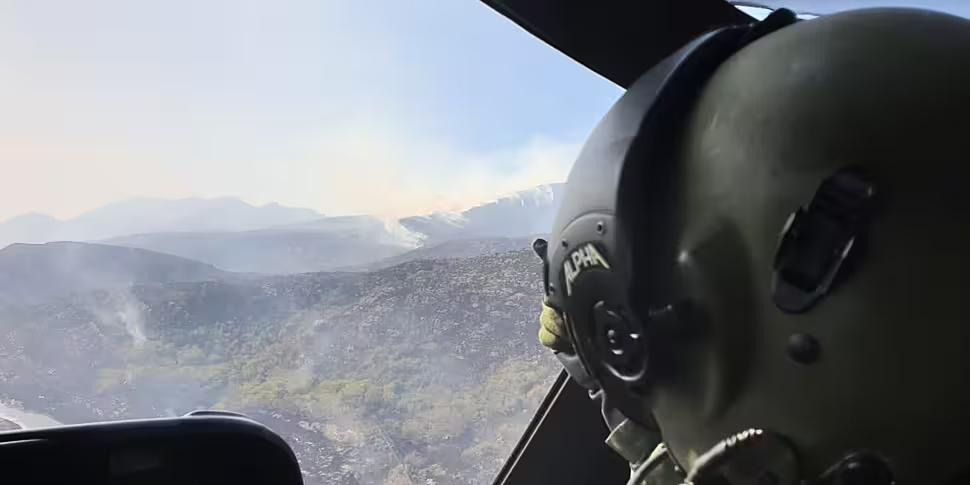Wildlife campaigners are calling for a “full investigation into the causes and consequences” of the fire that ripped through Killarney National Park over the weekend.
Thousands of hectares of the park were damaged in the blaze which originally broke out in a number of areas to the south of Killarney town.
The blaze was eventually brought under control this morning; however, helicopters are still working to damp down a number of hot spots in the area.
Over 50,000litres dropped on the #KillarneyNationalPark fire, but please continue to exercise extreme caution in the vicinity of a very dangerous fire. pic.twitter.com/Ab0mpQreyu
— Irish Air Corps (@IrishAirCorps) April 24, 2021
Wildfires have been increasing across the country over the past decade and last weekend alone there were fires in Wicklow, Cork and Mayo as well as in the Mourne Mountains in County Down, where a major incident was declared.
The causes of the fires have yet to be determined; however, they are believed to be the result of human activity.
Latest update on today’s severe fire in Killarney National Park, including statement from Minister @noonan_malcolm.
There may still be reduced visibility in the area due to smoke, so please exercise caution if travelling on the N71. pic.twitter.com/vhYXnbzxAE
— Department of Housing, Local Government & Heritage (@DeptHousingIRL) April 24, 2021
While it is illegal for farmers to burn any growing vegetation between March and August each year, many fires have been reported since the prohibition came into effect this year.
In a statement, the Irish Wildlife Trust (IWT) said the Killarney fire was “only one of a number of fires on upland areas in recent days and are part of an annual ritual which has been going on for over a decade.”
“The IWT feels that the law surrounding these illegal fires must be enforced and a cultural shift is needed to discourage the burning of land for agricultural purposes,” it said.
“Politicians and farming organisations must show leadership in this regard.”
1. A large fire & very serious is burning in Killarney National Park. @npwsBioData staff & the Fire Brigade are currently on site dealing with the incident. We are asking members of the public to avoid areas of the Park listed below until further notice: pic.twitter.com/3DdDiL8wZj
— Department of Housing, Local Government & Heritage (@DeptHousingIRL) April 24, 2021
IWT Campaigns Officer Pádraic Fogarty called on the Government to “initiate an emergency response to the spate of out-of-control fires which are devastating wildlife habitat, poisoning air and water and releasing greenhouse gases.”
“it is nearly two years since the Dáil declared a climate and biodiversity emergency yet we are still waiting on emergency measures which would break the annual cycle of infernos that has wreaked havoc on our natural environment,” he said.
“We know what those measures are but we have so far lacked the political will and leadership from farm organisations to see these through.”
We want to see:
➡️immediate suspension of eligibility rules for uplands
➡️Addition of GHG emissions to national calculations
➡️Management measures for SACs/SPAs incl. end of harmful practices in these areas
➡️Expand Coillte Nature to restore habitats on peatland plantations— Irish Wildlife Trust (@Irishwildlife) April 26, 2021
➡️prohibition of all burning of peat habitats
We need a cultural shift away from fire as a management tool and leadership from farm organisations and politicians 🔥
— Irish Wildlife Trust (@Irishwildlife) April 26, 2021
In a statement, the Minister for State with responsibility for parks and wildlife, Malcolm Noonan, noted that the “main source of wild fires is frequently thought to be the deliberate starting of fires without concern for the consequences.”
“Uncontrolled burning can kill nesting birds including birds like the curlew which has been lost from huge areas of Ireland,” he said.
“It can destroy other species and habitats, damage commercial forestry and leave areas unsuitable for grazing for a long period of time.
“Uncontrolled and unplanned burning can result in a monoculture of more dominant, stagnant vegetation types over large areas.”
Emergency services will continue operating at Killarney National Park throughout the day to ensure the fires are fully out.









